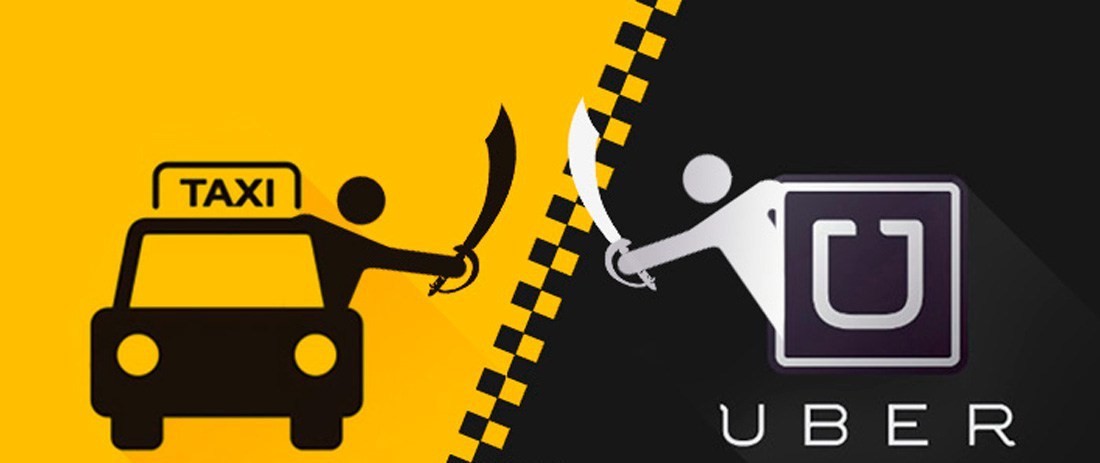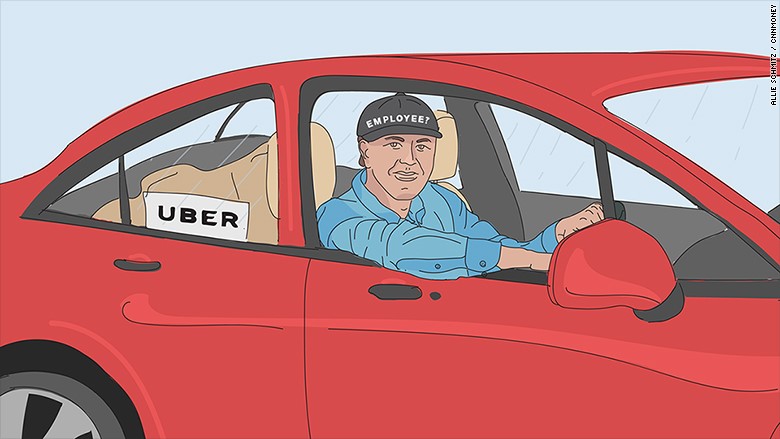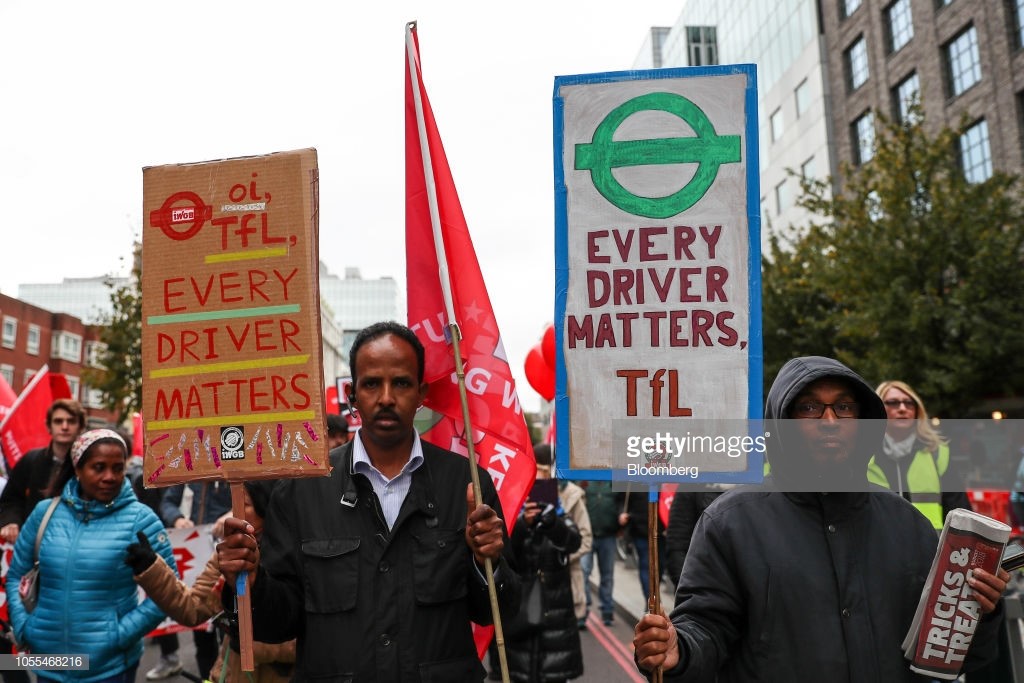 Uber has lost its latest court bid (on 19 December 2018) to stop its British drivers being classified as workers, entitling them to rights such as the minimum wage and holiday pay, in a decision which jeopardises the taxi app’s business model. Read more… (Petra Ágnes Kanyuk)
Uber has lost its latest court bid (on 19 December 2018) to stop its British drivers being classified as workers, entitling them to rights such as the minimum wage and holiday pay, in a decision which jeopardises the taxi app’s business model. Read more… (Petra Ágnes Kanyuk)
Uber has lost its latest court bid (on 19 December 2018) to stop its British drivers being classified as workers, entitling them to rights such as the minimum wage and holiday pay, in a decision which jeopardises the taxi app’s business model.
An „early Christmas present” for Uber drivers
A majority of judges at the UK’s Court of Appeal, the second-highest court in the land, ruled in favor of Uber drivers James Farrar and Yaseen Aslam, who in 2016 successfully argued at an employment tribunal that they were employees working for the company, rather than self-employed. „They approve the reasoning of the Employment Tribunal, which relied on a number of features of Uber’s working arrangements as being inconsistent with the driver having a direct contractual relationship with the passenger,” the Court of Appeal said in a summary. Master of the Rolls Sir Terence Etherton, with whom Lord Justice Bean agreed, said that the tribunal was „not only entitled, but correct” to find that each of the claimants was driving for Uber as a worker. Dismissing Uber’s appeal, he added: „as to the reality, not only do we see no reason to disagree with the factual conclusions of the (tribunal) as to the working relationship between Uber and the drivers, but we consider that the (tribunal) was plainly correct.” Lord Justice Underhill, dissenting, said drivers should only be treated as working from the moment they accept a trip. He said the issues raised in the appeal were matters of policy which Parliament was „better placed” to consider than the courts. He added: „The whole question of whether and how to adapt existing employment law protections to the development of the so-called gig economy and in particular to the use of service-provision platforms such as Uber, is under active review by the Government at present.”
Uber said it would appeal the verdict, meaning the legal process will continue. „This decision was not unanimous and does not reflect the reasons why the vast majority of drivers choose to use the Uber app,” said a spokeswoman. „We have been granted permission to appeal to the Supreme Court and will do so.” The firm said Uber drivers already earn more than the living wage in London, a non-compulsory hourly rate of £10.20 ($12.90) that takes everyday living costs into consideration. „If drivers were classified as workers they would inevitably lose some of the freedom and flexibility that comes with being their own boss,” Uber said. Nevertheless, the firm has more than 45,000 licensed drivers operating in London and over 3.5 million riders in the UK capital using its app, and it also announced a tie-up with insurance provider AXA earlier this year to offer European drivers insurance coverage for injury, sickness and family leave payments. Despite this, Uber has previously told policymakers that if it was required to pay such benefits to the circa 50,000 drivers operating on its platform in the UK it would cost its business „tens of millions” of pounds.
Court battles over definitions
 In November 2017, the Employment Appeal Tribunal dismissed Uber’s appeal against an earlier tribunal ruling from 2016, that former drivers Yaseen Aslam and James Farrar were workers at the time they were operating for Uber. But, at a hearing in October, the company’s barrister Dinah Rose QC said the finding that Uber drivers were workers ignored the fact that its relationship with drivers was „typical of the private hire industry”. Uber was not „unusual” because of the relationship between it and its drivers, „but because the Uber app enables it to operate on a much larger scale than traditional minicab companies”, she argued.
In November 2017, the Employment Appeal Tribunal dismissed Uber’s appeal against an earlier tribunal ruling from 2016, that former drivers Yaseen Aslam and James Farrar were workers at the time they were operating for Uber. But, at a hearing in October, the company’s barrister Dinah Rose QC said the finding that Uber drivers were workers ignored the fact that its relationship with drivers was „typical of the private hire industry”. Uber was not „unusual” because of the relationship between it and its drivers, „but because the Uber app enables it to operate on a much larger scale than traditional minicab companies”, she argued.
The initial employment tribunal found Uber’s agreements with drivers contained „fictions, twisted language and even brand new terminology”, and that the contracts „did not correspond with the practical reality”. However, Rose said that the contracts „reflected the true relationship and terms of the agreements between the parties”. She added that both tribunals had „erred in law” in concluding that the pair were workers, submitting that they had „wrongly disregarded the written contracts in which the parties’ agreements were recorded”. In the meantime, unions are keeping up the pressure on the ride-hailing giant, calling a drivers strike two months ago and urging Uber to immediately apply the tribunal judgement and implement „employment conditions that respect worker rights for drivers, including the payment of at least the minimum wage and paid holidays”. Before the October hearing, hundreds of precarious workers attended a demonstration organised by the Independent Workers Union of Great Britain (IWGB), which represents Aslam and Farrar.
The Court of Appeal decision followed a case that was concluded in June 2018, when UK firm Pimlico Plumbers – losing at every stage of the dispute – lost an appeal at the UK Supreme Court, arguing that those it sent out to repair leaking pipes and malfunctioning dishwashers were self-employed and not workers. Being self-employed in Britain entitles people to fewer benefits than those who are hired directly by companies. Freelancers and independent contractors are granted basic health and safety protections, but not a minimum wage, holiday pay or breaks. The claim was brought by Gary Smith, from Kent, who worked for Pimlico Plumbers as a plumber and heating engineer for six years until 2011, when he suffered a heart attack. He claimed his subsequent request for a three-day week was rejected, the Pimlico Plumbers van he rented was taken away, and he was dismissed. The firm disputed Smith’s assertion that he was sacked because he wanted to work fewer days.
Some aspects of Smith’s conditions resembled self-employment, such as the entitlement to refuse work, the judgment said, but others „betrayed a grip on his economy inconsistent with his being a truly independent contractor”. These included the fact that he wore a branded uniform, had a tracker in his branded van and carried an identity card. An employment tribunal ruled that Smith was a worker, but not an employee. Pimlico appealed this decision but both the Employment Appeal Tribunal and the Court of Appeal backed the tribunal’s finding. The Supreme Court’s decision paved the way for Smith to take action against Pimlico Plumbers as a worker, including a claim that he was unfairly dismissed. What is more, it could definitely have wide implications for workers’ rights, as the present case demonstrates.
Every driver matters
Uber, which could be valued at $120 billion in a flotation, has faced protests, regulatory crackdowns and licence losses around the world as it challenges existing competitors and rapidly expands. Unions argue that the gig economy – where people often work for various firms at the same time without fixed contracts – is exploitative, whilst Uber says, as stated above, that its drivers enjoy the flexibility and on average earn much more than the minimum wage. The firm also pointed out that its practices have been widely used for decades in Britain by minicabs, private hire vehicles which cannot be hailed in the street like traditional black taxis. The IWGB attacked Uber for appealing court decisions which have gone against the firm. „It is becoming increasingly ridiculous for so-called ‘gig economy’ companies to argue that the law is unclear when they lose virtually every tribunal and court case,” said General Secretary Jason Moyer-Lee. Tim Roache, general secretary of the GMB union (general trade union in the UK) expressed that: „we’re now at a hat trick of judgements against Uber – they keep appealing and keep losing. Uber should just accept the verdict and stop trying to find loopholes that deprive people of their hard won rights and hard earned pay.” Employment lawyer Nigel Mackay also stressed that „…this is the third time that the drivers have been victorious in their fight for workers’ rights but Uber has yet to give their drivers what three legal decisions have ruled they are entitled to holiday pay and to be paid at least the national minimum wage.”
more than the minimum wage. The firm also pointed out that its practices have been widely used for decades in Britain by minicabs, private hire vehicles which cannot be hailed in the street like traditional black taxis. The IWGB attacked Uber for appealing court decisions which have gone against the firm. „It is becoming increasingly ridiculous for so-called ‘gig economy’ companies to argue that the law is unclear when they lose virtually every tribunal and court case,” said General Secretary Jason Moyer-Lee. Tim Roache, general secretary of the GMB union (general trade union in the UK) expressed that: „we’re now at a hat trick of judgements against Uber – they keep appealing and keep losing. Uber should just accept the verdict and stop trying to find loopholes that deprive people of their hard won rights and hard earned pay.” Employment lawyer Nigel Mackay also stressed that „…this is the third time that the drivers have been victorious in their fight for workers’ rights but Uber has yet to give their drivers what three legal decisions have ruled they are entitled to holiday pay and to be paid at least the national minimum wage.”
Commenting on the decision, Rachel Farr, also an employment lawyer, suggested the judgement could have complications for other gig economy platforms, bolstering those that argue such workers „deserve a better deal”. Though she also emphasized the case-by-case nature of employment classification decisions. „This decision will have an impact both across the gig economy and in more traditional sectors and will give encouragement to claimants in other cases which are awaiting a hearing or stayed pending the outcome,” she said in a statement. „But just because Uber lost, it doesn’t mean that others will: each case will be considered on its specific facts, including the contractual terms between the parties and what actually happens in practice.” Andrew Chamberlain, deputy director of policy at the Association of Independent Professionals and the Self-Employed, also highlighted that: „The first thing to remember is this wasn’t a ruling on all self-employment or even the rest of the gig economy…the fact is most people in self-employment and the gig economy enjoy their flexibility and are happy with their status… Self-employment is dynamic, always changing and very diverse.”
Food delivery startup Deliveroo, for example, has so far prevailed in UK courts – recently, in November 2018, the High Court – against union-backed attempts to gain collective bargaining rights by challenging its classification of couriers as independent contractors after a UK employment tribunal judged that Deliveroo riders are self-employed – and could not be considered workers. In this regard, the Court pointed out that the riders had a genuine right to find a substitute to do their job for them, they were able to pass a job to a substitute, which means they were not obliged to provide a „personal service”.
A reform package of „baby steps”?
At the same time the government has been consulting on updating employment law to take account of tech-fuelled changes to working patterns. Days before the present Uber decision, it set out a package of workplace reforms, which the government describes as the biggest in over twenty years. The plan is based on the findings of a review of modern working practices by Matthew Taylor, chief executive of the Royal Society of Arts and built on reforms outlined earlier in 2018. It is said that platform-based working – including the likes of Uber or Deliveroo – offers „genuine two-way flexibility” for firms and workers, and can „provide opportunities for those who may not be able to work in more conventional ways”. Among the main plans announced by the Business Department are:
- the formula to work out their holiday pay will be made fairer;
- zero-hour contract workers will get the „right to request” a more „predictable and stable” set of hours;
- workers will be considered „continuous workers” – with more rights – even if their service is broken by up to four weeks (currently it’s just one week);
- an escape clause that lets firms hire agency workers on lower wages than staff is being closed (the „Swedish derogation” will be repealed in the UK – stopping firms holding workers on long-term contracts but with periods of little to no work);
- workers will get a „written statement” of their rights on day one (currently it’s only available to full employees after two months and this includes sick leave and maternity or paternity leave);
- firms that have shown „malice, spite or gross oversight” in an employment tribunal can be fined £20,000.
But despite some gig economy platforms standing accused of exploiting workers, the government’s package does not look set to require a radical reworking of existing business models – and unions have attacked the reforms as lacking substance, warning its a „reluctant baby step” and pointing out that, for example, a right to request a more stable contract doesn’t add up to much of a rights advance. „The long-drawn history of the Uber case shows that the current law is not easy for businesses and those who work for them to understand. Clarifying such a complex area of law is easier said than done and it remains to be seen what this promise will actually mean,” Farr noted. On the contrary, the aforementioned firms appreciated the commitment: „We welcome more clarity from the government and look forward to working closely with them to make sure drivers can keep all the benefits that come from being your own boss,” said an Uber spokeswoman. Deliveroo said it would work with the government to ensure the interests of its riders can be advanced.
**************
To conclude, we should keep in mind the following thoughts of Andrew Chamberlain: „What this latest twist in the Uber saga does show, however, is just how complex this area is, and how much it takes to prove who is and isn’t self-employed… This case is only the latest example of how our creaking, outdated employment statuses simply aren’t keeping up.”
For a list of references, click HERE.
Author: Petra Ágnes Kanyuk, PhD student, University of Debrecen, Faculty of Law
Source of the images used:
http://www.completenewsng.com/uber-appeals-uk-court-case-on-drivers-right-of-worker-status/
https://money.cnn.com/2016/10/28/technology/uber-drivers-workers-rights-uk/
https://www.gettyimages.ca/detail/news-photo/demonstrators-hold-signs-reading-every-driver-matters-news-photo/1055468216
